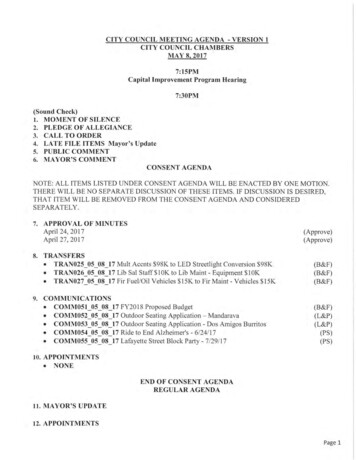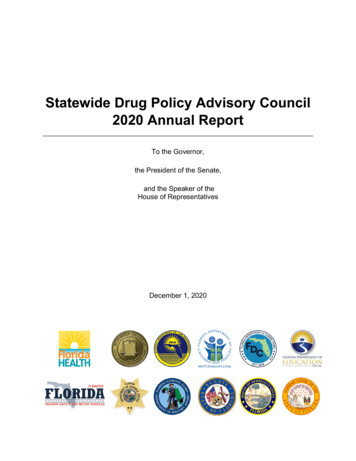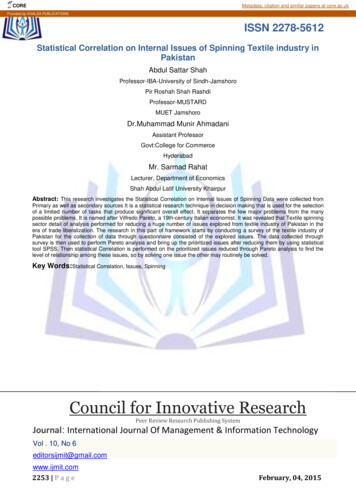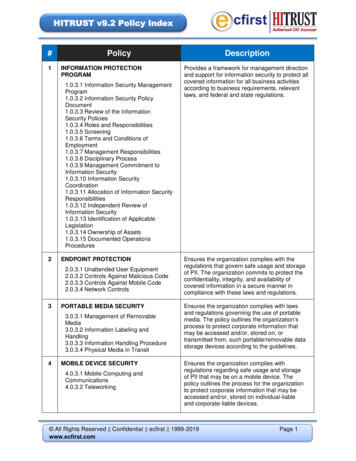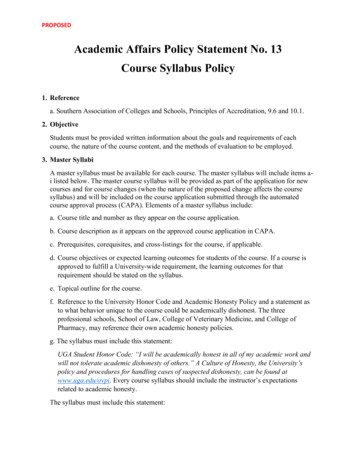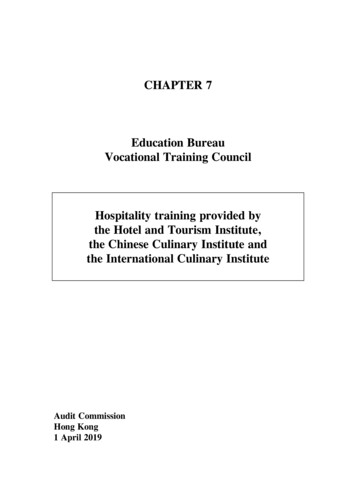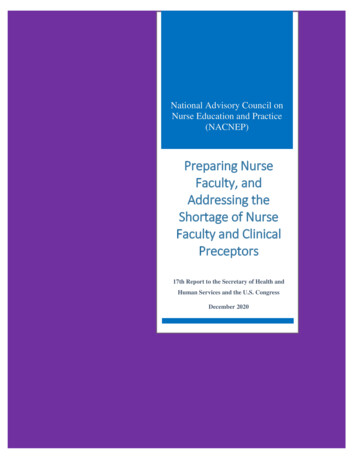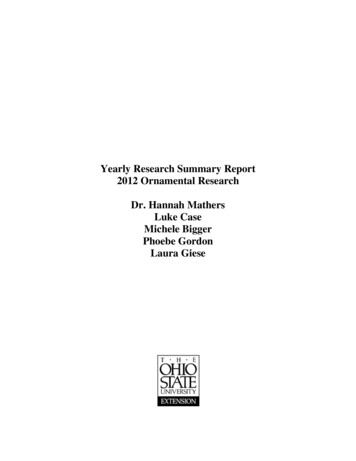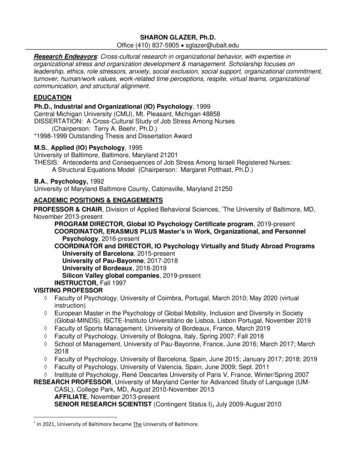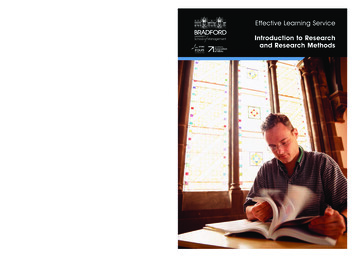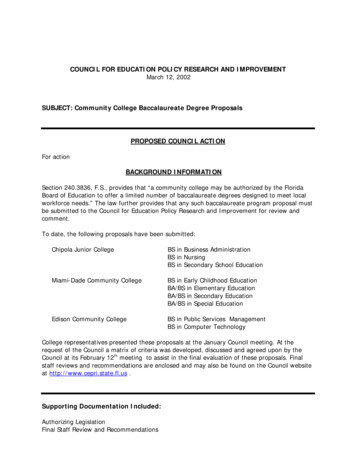
Transcription
COUNCIL FOR EDUCATION POLICY RESEARCH AND IMPROVEMENTMarch 12, 2002SUBJECT: Community College Baccalaureate Degree ProposalsPROPOSED COUNCIL ACTIONFor actionBACKGROUND INFORMATIONSection 240.3836, F.S., provides that “a community college may be authorized by the FloridaBoard of Education to offer a limited number of baccalaureate degrees designed to meet localworkforce needs.” The law further provides that any such baccalaureate program proposal mustbe submitted to the Council for Education Policy Research and Improvement for review andcomment.To date, the following proposals have been submitted:Chipola Junior CollegeBS in Business AdministrationBS in NursingBS in Secondary School EducationMiami-Dade Community CollegeBS in Early Childhood EducationBA/BS in Elementary EducationBA/BS in Secondary EducationBA/BS in Special EducationEdison Community CollegeBS in Public Services ManagementBS in Computer TechnologyCollege representatives presented these proposals at the January Council meeting. At therequest of the Council a matrix of criteria was developed, discussed and agreed upon by theCouncil at its February 12th meeting to assist in the final evaluation of these proposals. Finalstaff reviews and recommendations are enclosed and may also be found on the Council websiteat http://www.cepri.state.fl.us .Supporting Documentation Included:Authorizing LegislationFinal Staff Review and Recommendations
Facilitators/Presenters:Dr. Proctor/StaffSector and Institutional Representatives
JOHN M. MCKAYPresidentTOM FEENEYSpeakerTHE FLORIDA LEGISLATURECOUNCIL FOR EDUCATION POLICY,RESEARCH AND IMPROVEMENTPhilip Morgaman, ChairAkshay Desai, Vice ChairDiane LeoneBob McIntyreEdwin MooreJacob StuartRobert TaylorPat TelsonMary WattsMarch 7, 2002MEMORANDUMTO:Members, Council for Education Policy, Research and ImprovementFROM:Bill Proctor, Executive DirectorSUBJECT:Chipola Community College Baccalaureate Degree Proposals andStaff RecommendationsSection 240.3836, F.S., provides that “a community college may be authorized by the FloridaBoard of Education to offer a limited number of baccalaureate degrees designed to meet localworkforce needs.” The law further provides that any such baccalaureate proposal must besubmitted to the Council for Education Policy, Research and Improvement for review andcomment. In addition to the Proposal Process and Review Procedures adopted by the Councilat its September 13th meeting, the Council adopted a criteria matrix on February 12th.Information submitted by the community colleges has been supplemented with informationobtained through surveys of existing four-year institutions, contact with WorkforceDevelopment Boards and other sources to assist in determining if the proposals deal withsignificant unmet needs which cannot be addressed more effectively through another method.Copies of the staff analyses and recommendations for the proposals submitted by Chipola areenclosed and summarized below. These will be considered at the March 12th meeting of theCouncil in Tampa.The college has requested a total of 343,999 for the first year development of theseprograms and 427,224 for the initial year of enrollment.William B. Proctor, Executive DirectorRoom 574 Claude Pepper Building, 111 W. Madison Street, Tallahassee, Florida 32399-1400Telephone (850) 488-7894 FAX (850) 922-5388
Chipola Community College – Page 2BS in Business AdministrationThis proposal should not be approved at this time. A cooperative program withother potential public and independent providers should be pursued with theassistance of the Division of Colleges and Universities and if not achieved withinone year, this proposal should be resubmitted. A critical need could not beestablished for this program. Individuals with BSBA degrees are occupied across a largerange of occupations but this particular credential is generally not required foremployment. Before creating a new program to address this area, Chipola should furtherexplore the potential for collaboration with existing four-year institutions.BS in Secondary EducationThis proposal should not be approved at this time. A cooperative program withFSU’s Panama City Branch and other potential public and independent providersshould be pursued with the assistance of the Division of Colleges andUniversities and if not achieved within one year, this proposal should beresubmitted. The subject areas of Science, Math, Engineering and Technology arerecognized as critical shortage areas statewide. However, the magnitude of the need inChipola’s service area does not warrant establishment of a new program at this time.BS in NursingThis proposal should not be approved, however efforts to include a rural healthcare track within the current cooperative program with FSU should beexamined. In addition, problems with advising and mentoring within thecurrent program need to be addressed by both institutions. A critical need couldnot be established for this program. A BS in Nursing is currently available at Chipola fromFSU via distance learning. Approximately twelve students are currently participating.Based on all available information the request to initiate this program is not warranted,however several modifications to the existing cooperative program with FSU should bepursued./dcaEnclosuresCc:Dr. H. Dale O’Daniel, President
CHIPOLA COMMUNITY COLLEGEBACCALAUREATE DEGREE PROPOSALBACHELOR OF SCIENCE IN BUSINESS ADMINISTRATIONSTAFF RECOMMENDATIONThis proposal should not be approved at this time. A cooperativeprogram with other potential public and independent providers shouldbe pursued with the assistance of the Division of Colleges andUniversities and if not achieved within one year, this proposal shouldbe resubmitted.While surveys suggest that there would be sufficient student enrollment in such aprogram, current and future demand for individuals with a BSBA in Chipola’s servicearea could not be established. It is recognized, however, that much of the difficulty inestablishing this demand is due to the fact that individuals with BSBA degrees areoccupied across a large range of occupations. It is also recognized that Chipola is in aneconomically depressed area, thus a BSBA degree, which individuals could use across arange of occupations would potentially assist in the socioeconomic state of the area. Itis also recognized that currently no distance education BSBA program exists in theFlorida Virtual Campus or through the Southern Regional Electronic Campus. However, itis the recommendation of the Council that such a BSBA program be achieved through acooperative agreement with a four-year institution. If efforts to secure a cooperativeagreement do not progress in the coming year, then Chipola should resubmit thisproposal.ISSUE MATRIXNEED1. Is the need in an area of critical concern?2. Is the need large, reflecting a significantshortage?3. Is the need driven by proven studentdemand?4. Has employer demand exceeded supply inthe past? Is demand projected to exceedsupply in the future?5. Is the need primarily related toprogrammatic content, nature of deliverysystem, or other?NOPg. 3NOPg. 3NOPg. 3NOPg. 3Nature of Delivery SystemPg. 41
POTENTIAL IMPACT6. Will the impact of the program have apositive impact on the current mission of theinstitution?7. Will the program cover a significantpercentage of the supply/demand gap?Unable to DeterminePg. 5N/APg. 5YESPg. 59. Will program increase access rather thansimply redistributing applicants?Unable to determine intent ofpotential applicantsPg. 510. Will program have adverse impact onpublic or independent providers?Unable to determine intent ofpotential applicantsPg. 5YESPg. 7NOPg. 7YESPg. 7YESPg. 7YESPg. 3YESPg. 8YESPg. 8YESPg. 88. Will program be of necessary qualityassociated with baccalaureate degree?USE OF RESOURCES11. Are there other programs withincommuting distance with unused capacity?12. Is there a cooperative program currentlyin place?13. Has a cooperative program beenproposed?14. Does the proposed program duplicateother programs currently within commutingdistance or through distance learning?15. Are there issues related toaccess/articulation that if resolved wouldpreclude need for the proposed program?IMPLEMENTATION16. Does proposal address steps necessaryfor accreditation?17. Does the program adequately addressother impacts or requirements associatedwith accreditation?18. Is there performance data foraccountability/evaluation?2
ACCOUNTABILITY19. Is the program 120 hours in length20. Does the program comply with commonprerequisites?21. Will the program be limited access?22. Proposed admission requirements.!!!COST EFFECTIVENESS23. Is the cost to the state less than otheroptions?First year Development- 95,333Initial per FTE - 3,61724. Is the cost to the students less thanother options?25. Will program contribute significantly tomeeting region workforce needs?YESYESPg. 9Pg. 9NO2.5 GPAAn AA degree orEquivalentCompletion ofprerequisitesPg. 9Pg. 9YES Compared to PublicsNO Compared to PrivatesPg. 10YESPg. 10N/APg. 103
ANALYSIS OF CRITERIAISSUE 1: NEED1.Is the need in an area of critical concern?!Jackson County has been classified as economically depressed by the Federaland State Government and is a Federal Rural Enterprise Community and is also aFlorida State Enterprise Zone. Chipola states that a better-educated workforcewould help in these efforts. However, a BSBA in not required to work inbusiness.!The Florida Agency for Workforce Innovation provided the following projectionsfor the year 2001 through the year 2009 for Florida Workforce Region 3:Calhoun, Holmes, Jackson, Liberty, and Washington counties:Fastest Growing IndustriesIndustries Gaining the Most NewJobs1.2.3.4.5.6.7.1. Local Government2. Health Services3. Eating and Drinking Places4. Social Services5. Food Stores6. Special Trade Contractors7. General Contractors, ExcludingBuilding8. Communications9. Membership Organizations10. General Merchandise StoresTransportation by AirCommunicationsBusiness ServicesAuto Repair Services and ParkingEngineering and Management ServicesLegal ServicesSocial Services8. Building Materials and Garden Supplies9. Agricultural Services10. Health ServicesFastest Growing OccupationsOccupations Gaining the Most NewJobs1. Telephone and Cable TVInstaller/Repairer2. Teacher’s Aide and EducationalAssistant3. Social Worker, Excluding Medical andPsych4. Nursing Aide and Orderly5. Teacher, Secondary School6. Cashier7. Textile Machine Operator8. General Office Clerk1. Correction Officer and Jailer9. General Manager and Top Executive10. Salesperson, Retail2. Cashier3. Salesperson, Retail4. General Office Clerk5. Nursing Aide and Orderly6. Teacher, Secondary School7. General Manager and Top Executive8. Teacher’s Aide and EducationalAssistant9. Textile Machine Operator10. Food Preparation Server, Fast Food4
!2.Of the top ten fastest growing jobs through 2008 in Chipola’s workforce district,none require a BSBA.Is the need large, reflecting a significant shortage?!The Florida Industry and Occupational Employment Projections for WorkforceDevelopment Region 3, Chipola’ district, shows projected employment through2008 for workers with a bachelor’s in business to be 292, or 48 per year.!It is difficult to quantify the need for individuals with a BSBA since that degree isnot a requirement to work in business. However, based on the three areas offocus (accounting, management, and MIS) for the Chipola proposal, thefollowing figures are the annual openings over the next 10 years, as projected bythe Chipola Regional Workforce Development Board.o Accounting – 3o General managers (This does not necessarily require a BSBA) – 24o Computer programmers, support specialists, systems analysts - 33.Is the need driven by proven student demand?!In 2000, Chipola conducted a survey to determine the baccalaureate degreesmost in demand in the district. Over 2000 responses were received and 518respondents indicated a desire to obtain a BSBA. The results of the survey areavailable if needed.!Based on surveys conducted by the institution, they suggest an initial enrollmentof 30, and by January 2004, when both years of the upper-level program will berunning concurrently, the enrollment should be over 60.!However, it is important to note that on one of the surveys included in thiscalculation, individuals were told, “The University Center @ Chipola JuniorCollege is investigating the possibility of collaborating with a university to offerone or more four-year and/or graduate Business degrees on Chipola’s campus.Of course, university personnel would teach the classes and the university wouldaward the degrees.” Since Chipola’s proposal does not involve collaboration witha university, responses to this survey are not applicable to the proposedprogram.4.Has employer demand exceeded supply in the past? Is demand projectedto exceed supply in the future?!!It is difficult to assess employer demand for individuals with BSBAs since onedoes not require such a degree to work in business and those possessing such adegree gain employment in a multitude of fields.5.8 percent of the workforce in Chipola’s workforce region are employed inexecutive, administrative, and managerial occupations.5
!Between March 2000 and March 2001, the total number of job seekers registeredwith One-Stop centers in Chipola’s Workforce region grew by 50 percent from444 to 671.!A representative of the Jackson County Chamber of Commerce estimated 50 to60 job openings per year.5.Is the need primarily related to programmatic content, nature of deliverysystem, or other?!While a critical need for individuals with BSBA degrees could not be establishedfor Chipola’s service area, Chipola states the need is primarily the deliverysystem, in that their students (due to the economically depressed nature of theirregion) cannot travel to other institutions offering BSBA programs. However,this seems as if it could be resolved if a four year institution would enter into acooperative agreement with Chipola to offer the program on their campus.Chipola states that area institutions have denied such requests.SUMMARYA critical need could not be established in Chipola’s service area for individuals withBSBA degrees. Most jobs within business do not require such a degree and individualspossessing such a degree are employed across an array of occupations.ISSUE 2: POTENTIAL IMPACT6.What impact would the program have on the current mission of theinstitution?! Clearly, if the proposed program were approved, the mission of Chipola would beexpanded. However, it is impossible to predict all the ramifications at this pointin time.7.What percentage of supply/demand gap is covered by the program?!8.No gap could be establishedWill program be of necessary quality associated with baccalaureatedegree?a. Faculty! Chipola proposes strict educational and professional requirements of applicanthired for the new positions necessary. SACS requires that 25 percent of coursesin business be taught by faculty with terminal degrees. In Chipola’s program thenumber will be closer to 50 percent.6
b. Facilities! Chipola states that they already have adequate facilities to house the programand it will move into a newly renovated building in Fall 2002.c. Curriculum! Chipola has proposed a preliminary curriculum and has stated they will adopt thestate’s common course prerequisites for business administration.d. Prerequisites! Chipola has proposed a preliminary curriculum and has stated they will adopt thestate’s common course prerequisites for business administration.e. Standards of field! It is difficult to articulate one succinct set of standards for the field of business,especially since it is one composed of several disciplines. Several businessassociations list “standards of professional practice”, which vary acrossorganizations. However, the accrediting agency for business programs fromwhich Chipola seeks accreditation has articulated certain standards for businessschools, thus if accreditation is granted by this organization, one can concludethat the institution is abiding by these proposed standards in educating theirfuture business professionals.9.Will program increase access or redistribute applicants?!Over 50 percent of Chipola’s graduates do not continue their education beyondthe two-year degree. This is the proposed program’s target audience, and thusnot individuals who would already be applying to other institutions. However, itis impossible to predict the intentions of potential applicants.10. Will program have adverse impact on public or independent providers?!This question is also impossible to quantify because it depends on the answer tothe previous question.SUMMARYWhile Chipola did appear to provide in their plan several mechanisms to ensure quality,the fact remains that a critical need for the program could not be established. Inaddition, while Chipola’s program is targeted to individuals who would not otherwiseapply to a four-year institution for such a program, the intent of applicants cannot bepredicted, thus the program’s effect on other institutions cannot be quantified.7
ISSUE 3: USE OF RESOURCES11. Are there other programs within commuting distance with unusedcapacity?!Yes:ooFSU’s Panama City Branch (60 miles from Chipola) offers the BSBAOther programs responded to our survey on unused capacity, howevernone were within commuting distance.12. Is there a cooperative program currently in place?!No13. Has a cooperative program been proposed?!Yes:oChipola proposed such a program to UWF, FAMU, FSU, and Troy StateUniversity and all declined the opportunity.14. Does the proposed program duplicate other programs currently withincommuting distance or through distance learning?a. Programs! The following institutions have BS programs in Bus Admin and Management FSU, UWF, FAMU, Barry, Flaglerb. Distance Learning! Florida Virtual Campus, while not listing a BSBA, does offer a BS in InformationStudies (one of the focuses of Chipola’s proposal) via distance learning throughFSU.15. Are there issues related to access/articulation that if resolved wouldpreclude need for the proposed program?!Yes, a major theme in Chipola’s stated need for the program is the inability oftheir students to commute to other institutions. However, if a university offeredthe program on Chipola’s campus, this would alleviate the need for the proposedprogram. As stated earlier, Internet surveys used to predict enrollment statedthe program would be a cooperative program with a university, thus while notvalid for the Chipola proposal, do indicate that students would enroll in such acooperative program.8
SUMMARYThere are several BSBA programs available to Chipola students. It is recognized, thatbecause of the area’s economically distressed profile, several students are not able tocommute to such programs because of a lack of resources. However, a cooperativeprogram with an existing four-year institution can best serve this need.ISSUE 4: IMPLEMENTATION16. Does proposal address steps necessary for accreditation?!Chipola has developed a timeline to seek SACS accreditation.17. Does the program adequately address other impacts or requirementsassociated with accreditation?!!The program will seek accreditation from the Association of Collegiate BusinessSchools and Programs (ACBSP). However, the Association to Advance CollegiateSchools of Business (AACSB) accredits all the state universities.The Southern Association of Colleges and Schools (SACS) reaffirmed itsaccreditation of the college in 1998. Based on subsequent follow-upcorrespondence there are no issues outstanding that would negatively impactthis proposal.18. Is there performance data for accountability/evaluation?According to the 2001 Articulation report compiled by the Department of Education,state university grade point averages of Chipola CC transfers generally comparefavorably to the average GPA for all community college transfe
SUBJECT: Chipola Community College Baccalaureate Degree Proposals and Staff Recommendations Section 240.3836, F.S., provides that “a community college may be authorized by the Florida Board of Education to offer a limited number of bacca
